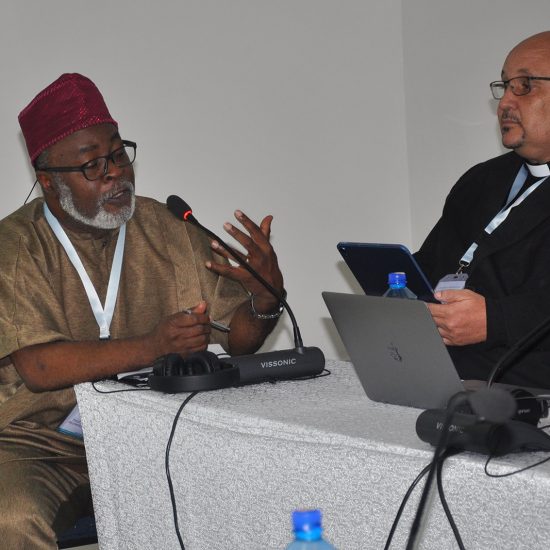Sermons on forgiveness often emphasize the Lord’s Prayer—“and forgive us our trespasses as we forgive those who trespass against us.”
But should Christians always forgive, regardless of circumstances? Is granting forgiveness always appropriate?
“Yes, but …,” four Christians who deal with the concept in different contexts responded.
Strive for justice
For Tarris Rosell, professor of pastoral theology, ethics and ministry praxis at Central Baptist Theological Seminary, justice is crucial to the ability to forgive another.
Rosell relates the story of an international student who had lost his family and several friends to genocide in his home country.
“Basically he said, ‘I cannot be a Christian because I cannot love or forgive the people who killed my family,’” Rosell noted. “That spoke to me about how easy it is to talk about love and forgiveness.”
Talk may be easy, but following through is much more difficult, he acknowledged. In contrast to some theologians, Rosell believes God instilled a natural desire to forgive.
“I think humans are amazingly forgiving, even though I know that goes against the theology of basic depravity. I think the natural tendency is to be forgiving,” he said.
Forgiveness comes more easily when the offender is up front and transparent. Citing former President Bill Clinton’s involvement with Washington intern Monica Lewinsky, “I think we are amazingly prone to forgive, but what we cannot tolerate, I think, is cover-up,” he said.
If Clinton and other politicians caught in immoral situations had been up front with the public, “at that point I think Americans naturally would have fallen over themselves to forgive.”
“I think this is the case in our professional and personal lives. … Somehow ‘I’m sorry’ matters,” he added. “What we cannot tolerate is cover-up and blaming.”
Rosell teaches ethics to and counsels with clergy-in-training and doctors-in-training. He believes openness by the perpetrator can facilitate the victim’s desire to forgive. Studies show doctors and hospitals that admit mistakes or wrongdoing are less likely to be sued than are those that do not, he said.
But, he added, true forgiveness must be rooted in justice. He follows Marie Fortune’s philosophy that forgiveness and justice must go hand-in-hand, often even when justice is not possible.
A United Church of Christ minister, Fortune is considered an expert in clergy abuse and is founder of the Faith Trust Institute, a Seattle-based organization focused on violence against women and children. She teaches there can be no forgiveness without justice.
Accountability and idolatry
Justice requires accountability, Rosell insisted. Ministers and their congregations sometimes act as though the only requirement to forgiveness is to change the victim’s attitude and to simply say: “We forgive you.”
“Sometimes what’s counted as forgiveness is the unwillingness to hold a brother accountable. … That is a sin,” he said.
Part of the problem in churches also stems from “pastor idolatry,” he added. “We make a god of the pastor, and when he sins, we often can’t recognize it because of our idolatry.”
Often clergy abusers aren’t held accountable because some church members will pressure the rest to “forgive” him or her. Lack of accountability opens opportunities for further abuse, he said.
Rosell encourages his ministerial students to view forgiveness as a process, rather than a platitude. “We ought not to press for forgiveness. Forgiveness is discovered, not forced,” he said.
Accountability is the primary issue for Speed Lea, as well. An expert in conflict management, particularly in churches, he is a consultant for the Alban Institute.
“It’s always important to maintain boundaries, and there needs to be consequences for missteps,” he said.
Consequences must be determined fairly, he stressed, rather than used as retribution. “Keep them within limits and avoid the vengeful kinds of responses our primitive brains might want to use to react.”
And victims must avoid becoming victims a second time by loosening or discarding consequences be-cause they fear the perpetrator will see them as being unforgiving—particularly if both claim to be Christians.
He tells the story of a church business manager who stole money from the offering plates and from a checking account during his 10 years of service. The congregation decided not to press formal charges but insisted the manager reimburse the church. And they insisted he find a job that did not involve dealing with money.
“Not all the congregation was happy, but the solution gave the opportunity for the individual to start a new life,” Leas said.
The author of Leadership and Conflict has identified five levels of conflict that can plague relationships. Forgiveness becomes more difficult as disagreement moves from problem solving to unmanageable conflict.
Sometimes finding forgiveness must be done through a third party. “It’s very hard when people are in the midst of the pain … to get to the possibility of repairing a breach,” he said. “Sometime the forgiveness is in the observers who can help until those involved can get beyond the pain.”
An act of obedience
Christians must forgive in obedience to God, said Richard Land, president of the Southern Baptist Convention’s Ethics & Religious Liberty Commission.
“It goes back to the Lord’s Prayer—forgive us as we forgive others,” he said.
Jesus added that believers would be forgiven in the same way in which they forgive others, Land stressed.
“Do we really want God to forgive us the way we forgive?” he asked.
Land emphasized that lack of forgiveness “will hinder growth and your spiritual relationship.” Believers should hold those who hurt them accountable, and in cases such as abuse, should remove themselves from the situation. But in every case, Christians must forgive.
“When we realize what Christ has done for us, how can we not forgive?”
And when believers find forgiveness difficult, they should “give it to the Lord,” he added. “Give it to Jesus, and then the power of the person to hurt you is gone.”
Releasing the burden to God
Roberta Damon, retired marriage and family counselor at First Baptist Church in Richmond, Va., and author of two books, believes forgiveness comes much more easily when the perpetrator repents and asks for forgiveness because the wounded individual can choose to forgive or not.
“But there are times when the perpetrator isn’t going to come to you … and there will be no reconciliation,” she said. That’s when the one wronged must release the pain and the burden to God.
“I don’t believe God’s forgiveness hinges on our ability to forgive,” she noted, pointing out that the Lord’s Prayer is sometimes misused to prove that it does.
When no accountability exists—either through the perpetrator’s seeking forgiveness or through the criminal justice system if a crime has been committed—the victim still must decide how he or she will react.
“The question is: What am I going to do with my own heart? The situation must be released into God’s hands,” she said. As a part-time counselor for First Baptist Church and for the Southern Baptist International Mission Board, the former missionary to Brazil asks counselees to visualize Jesus walking the road to Calvary.
“You see him stumble with the crosspiece and fall to one knee. Now visualize yourself placing your burden on that crosspiece,” she tells them.
“Our first reaction is that we feel sorry for him, and we don’t want to add to his burden,” Damon said. “But we know that we must release our burden and our heart into God’s hands.
“Add your burden, and watch him get up.”






